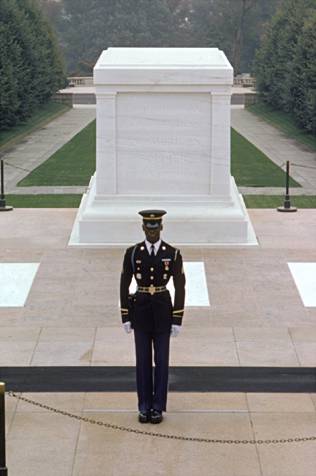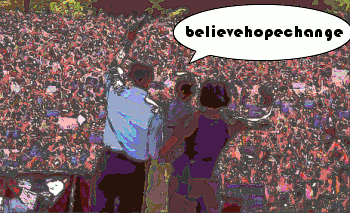The Grasping Tentacles of Obama's Church
Faultline USA has an important article updating the story of what's going on at Obama's church, the Black Liberation Theology espousing Trinity United Church of Christ in Chicago. He found a video of a sermon that Otis P. Moss III, the new preacher at TUCC, and his father, Otis P. Moss, Jr., gave together.
If you mix the Exodus with a pagan Igbo legend and let the pagan legend supply the meaning, you will not end up with the Christian message. That Moss sermon is thoroughly pagan. How can it be preached at a Christian church, and the church not be realized to be heretical?As luck would have it, I found a very enlightening, and very troubling, sermon given in tandem by Dr. Otis Moss Jr. and Rev. Otis Moss, III. Can Moses Generation Meet the Joshua Generation? Now you would have to go to the BLT African American Pulpit to find this hour long sermon. It isn’t on YouTube. But like anything of great value, a little time well invested is worth its weight in gold!
Gold? Yes, the kind of gold we need to expose the depths of BLT Heresy, and its Revolutionary form of anti-Americanism.
The sermon starts out with Biblical readings and then . . .
Rev. Otis Moss Jr. reads to his son, Rev. Otis Moss III, a letter written by Afro-centric Moses to Joshua in the 21st Century. Afro-centric Moses says that "my Afro-centric heritage has served me well . . .I survived genocide because my mother and my father practiced civil disobedience . . .in spite of the Euro-centric distortions of my African-ness . . .”
The entire gist of the sermon is the creation of a new mythos based on the connection of Africans to Moses and the Israelites who were "kept under of the heavy hand of genocide and slavery 400+ years of bondage.”
The constant refrain throughout the sermon is to never forget the past, and the obvious implication is to never forget that Africans are the oppressed – and, most of all, to never forget who the oppressors are!
When the old preacher said Kulay-Ba (cooley ba? kuleba? koo-lay-ba?) in the ear of the flying Africans the word entered into them and could not be taken out. That is a sorcerous, pagan word. The sermon is about permanently changing the Africans into pagans. It is not about Christianity, but something else that must not be confused with Jesus' message. It is about "liberation" in the form of permanent revolution, by means of a magic word passed down from pagan times. In other words, it carries a black-nationalist Marxist message that appeals to a revived paganism and casts white people as the reviled other.
The Black Liberation Theologists also forget, in their emphasis on the Egyptians as the eternal oppressors of the Israelites, that Jesus fled the Romans to take refuge in Egypt. The world changes. The face of the oppressors changes. The place of refuge changes. Just as it is with the dark-skinned American descendants of slaves. Their oppressors are not the same people who used to oppress them, but an oppressive belief system known as bureaucratic big government that holds them as slaves on the new plantations known as "the projects."
In these new plantations they lack privacy and safety. There is no effective law. They are left to the depredations of predatory drug dealers and other criminals. There is no community around them as employers cannot stay in business in the shadow of a project, as the coddled criminals continually test and rob every business nearby. The Law was scrubbed and racist remnants were removed during the 1960s and 70s. But the plantations have been denied the protection of the Law because of understandable black fears of the formerly racist legal system. These fears are understandable but they are wrong. When the Law fails to pursue criminals and punish them, or treats criminals as children who deserve their hand slapped for major crimes, then criminals take heart in the chaos and they grow more powerful and more dangerous. The prevalence of welfare in the new plantations is another sign of slavery. Rather than paying a poverty wage for hard work as slavery did, welfare pays a poverty wage for not working, or working off the books, and rewards the breakup of families. Neither slavery nor welfare allows people to rise above it, unless they reject it utterly. And rejection of the new plantations is also needed, not only by those who live within them, but by everyone who really cares about allowing people to raise themselves up out of financial, moral, and mental poverty.
Based on my comment at Faultline USA.
§
Technorati Tags: Obama, Christianity, Heresy, Trinity, Otis P. Moss III, Religion




 I had to work today, on Memorial Day. The Titanium mines of Titan are a cruel taskmaster indeed. And yet I took a moment to remember those who have given all their tomorrows for my tomorrows and the tomorrows of those who are close to me. Thank you brave men and women. Thank you for caring enough to risk it all. I don't deserve your deaths, but then none of us do. We don't believe in human sacrifice, not our country, but in men doing what is necessary and putting themselves at risk in order to do what must be done against those who do believe in human sacrifice, the burning bull of Moloch, the suicide bombers and headchoppers and torture-murderers of the global jihad death-cult.
I had to work today, on Memorial Day. The Titanium mines of Titan are a cruel taskmaster indeed. And yet I took a moment to remember those who have given all their tomorrows for my tomorrows and the tomorrows of those who are close to me. Thank you brave men and women. Thank you for caring enough to risk it all. I don't deserve your deaths, but then none of us do. We don't believe in human sacrifice, not our country, but in men doing what is necessary and putting themselves at risk in order to do what must be done against those who do believe in human sacrifice, the burning bull of Moloch, the suicide bombers and headchoppers and torture-murderers of the global jihad death-cult.



